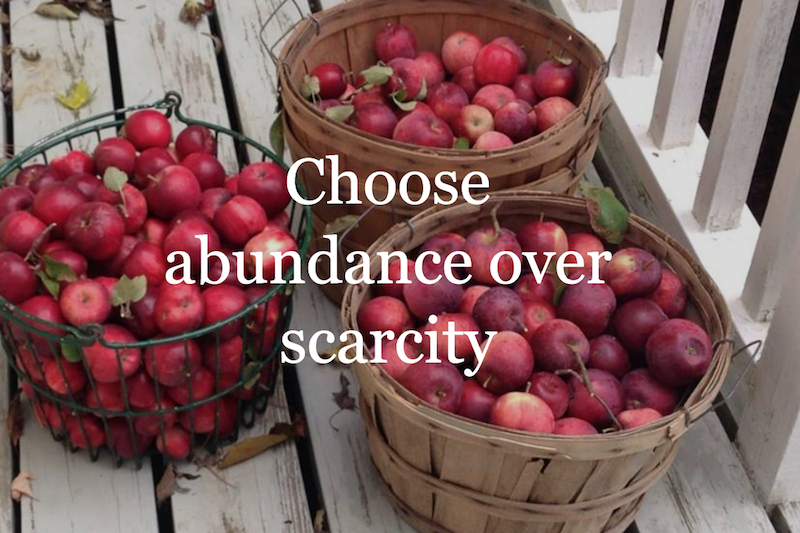The best book marketing advice I ever got came from Guy Kawasaki — not in person, but in his book APE: Author, Publisher, Entrepreneur. Reading that book before setting out on my own publisher adventure, I encountered his analogy about bakers:
“There are two kinds of people: eaters and bakers. Eaters think the world is a zero-sum game: what someone else eats, they cannot eat. Bakers do not believe that the world is a zero-sum game because they can bake more and bigger pies. Everyone can eat more. People trust bakers and not eaters.” — Guy Kawasaki
This was the first time I’d encountered this idea of generosity and abundance in the context of book publishing and promotion. But it would resurface many times.
Book Marketing with an Abundance Mindset
Are you an eater or a baker? Do you act from a sense of scarcity (your gain is my loss) or abundance? You have many opportunities to make this choice. For example:
- Do you keep your content under lock and key, afraid that people will steal your ideas? Or do you spread your ideas widely?
- Do you see other authors as competition for a fixed, limited market, or as a source of partnership and support?
- Do you expect everyone you interact with to purchase the book, or do you share review copies and author copies freely with readers, reviewers, and other influencers?
Choose abundance over scarcity.
After slaving away for months or years on your book and investing in its publication, it’s only natural that you want to protect your content and maximize the return on your investment.
But the scarcity mindset can cripple your success — particularly when you’re just getting started.
I have heard new and aspiring authors voice their scarcity-based concerns, afraid to take the actions that would support their book’s growth:
- A nonfiction author didn’t want to write or speak about the topic until the book was published, out of fear that others would jump on the idea.
- A new fiction author expressed a fear of sending review copies because someone might distribute the book on the Internet ahead of its release; she’d heard of it happening to Stephenie Meyer.
- New authors lose sleep about others pirating their books. (Read Tim Grahl’s take on this in his article Ebook Piracy= Sell More Books.)
My advice in each situation is the same: Take a deep breath and let it go. You’re getting in the way of your success by keeping the book out of the hands of people who might help you.
People buy books from authors that they like and trust. But first they have to find you. You will need to share your content, make friends with other authors, and rely on others to help you spread the word.
Check Your Mindset
Even if you approach the world with an abundance mindset in other situations, you may find yourself tested when marketing and promoting your book.
Let’s look at a few of the ways that a scarcity mindset interferes with book marketing strategy.
Working with other authors
When you hear about another author in your genre having success, do you feel competitive? If you have a scarcity mindset, you may feel, deep down, that this author’s success takes away from your potential audience.
In reality, authors often help each other. They answer each others’ questions. Many like-minded authors use joint marketing and book bundling to great effect. If you cling to a scarcity mindset, you will miss these opportunities.
Review copies
Some authors view every review copy given away as a lost sale. That’s flawed logic. If people never hear about the book, they won’t buy it.
Be generous with your books. Independently-published authors often have more control over giving away copies than authors working with legacy publishers, for whom review copies are more expensive. Plan on giving away many books to those who can support you.
Sharing content from the book
Authors with an abundance mindset share freely of their content, attracting people who value what they have written. Offer free chapters, worksheets, or other content from your book to gain either new sales or sign-ups to your mailing list.
Some publishing contracts restrict how much copyrighted content you can give away. If you are traditionally published and face those restrictions, you can paraphrase the content and share it. Ideas are free.
Pricing
Pricing is a complex matter with many variables. Your objective is to earn royalties — over time. Sometimes to earn long-term royalties, you sacrifice the quick returns. Experiment and figure out what works for your market.
A BookBub promotion is a great example. Giving away free copies for a day or two can drive sales for weeks or months afterwards.
Resetting Your Mindset
You can recognize the scarcity mindset by the way it feels — a knot in your stomach, anxiety, tension, fear, or jealousy.
Whenever you feel it, take a breath and let it go. Choose abundance. If nothing else, it simply feels better.
Remind yourself that good ideas don’t get “used up” when they are shared. People buy your book because they like your ideas or stories, so spread them.
I read an essay by a nonfiction author — I forget which one — who operated on the theory that when the first 1,000 copies of his book were out in the world, it would start to take off. So he gave away the first 1,000 copies of his book.
Yep, he gave them away. (If you find and remember who this was, please let me know in the comments!)
I think of his story any time I feel the constriction of scarcity creep into my thinking.
You may not want to give away 1,000 books. Fair enough. But the idea of a critical mass is powerful. I saw it for myself, when my first book hit 1000 copies. Things started happening that I wasn’t instigating.
That’s the power of abundance.
Do you see the book publishing and promotion as a zero sum game? Are you fighting for your slice of the pie? Or are you willing to give freely and assume that things will rebound?
Ideas multiply when shared. Let yours out into the world.
You know what I’m going to here say, don’t you? If you like this, share it with others. I’m off to bake more pies.

